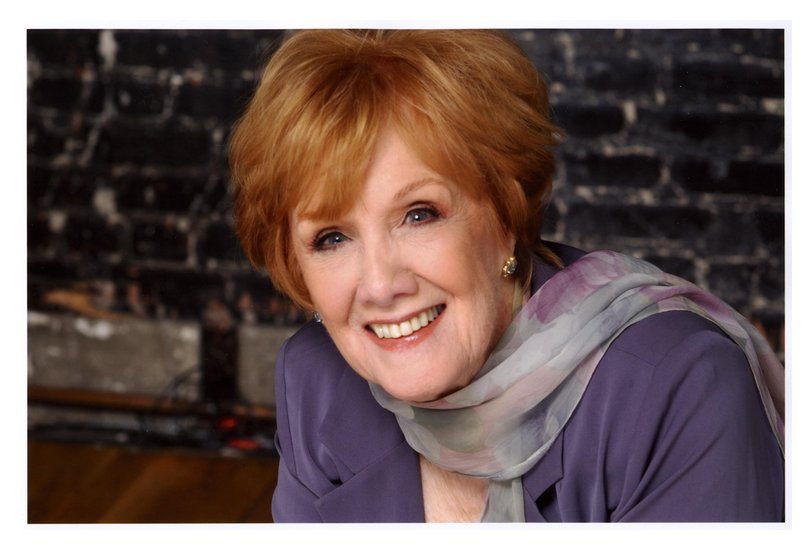

| "Loverly" soprano Marni
Nixon has ensured herself a proper place in film history although most
moviegoers would not recognize her if they passed her on the street.
But if you heard her, that might be a horse of a different color. Marni
is one of those unsung heroes (or should I say "much sung" heroes)
whose incredible talents were given short shrift at the time. For those
who think film superstars such as Deborah Kerr, Natalie Wood, and
Audrey Hepburn possessed not only powerhouse dramatic talents but
amazing singing voices as well...think again. Kerr's Anna in The King and I (1956), Natalie's
Maria in West Side Story
(1961), and Audrey's Eliza in My
Fair Lady (1964) were all dubbed by the amazing Marni Nixon, and
nowhere in the credits will you find that fact. Born Marni McEathron in Altadena, California, she was a former child actress and soloist with the Roger Wagner Chorale in the beginning. Trained in opera, yet possessing a versatile voice for pop music and easy standards as well, she not only sang for Arnold Schönberg and Igor Stravinsky but also recorded light songs. Marni made her Broadway musical debut in 1954 in a show that lasted two months but nothing came from it. In 1955, the singer contracted to dub Deborah Kerr in The King and I (1956) was killed in a car accident in Europe and a replacement was needed. Marni was hired...and the rest is history. Much impressed, the studios brought her in to "ghost" Ms. Kerr's voice once again in the classic tearjerker An Affair to Remember (1957). From there she went on to make Natalie Wood and Audrey Hepburn sound incredibly good with such classic songs as "Tonight" and "Wouldn't It Be Loverly." She finally appeared on screen in a musical in The Sound of Music (1965) starring Julie Andrews, who physically resembles Marni. The role is a small one, however, and she is only given a couple of solo lines in "How Do You Solve a Problem Like Maria?" as a singing nun. Marni's vocal career in films dissolved by the mid 1960s, but she continued on with concerts and in symphony halls, while billing herself as "The Voice of Hollywood" in one-woman cabaret shows. Throughout the years, she has played on the legit stage, including the lead roles in The King and I and The Sound of Music, and in her matronly years has been seen as Fraulein Schneider in Cabaret, and in the musicals Follies and 70 Girls 70. Her last filmed singing voice was as the grandmother in the animated feature Mulan (1998) in the 1990s. Married three times, twice to musicians; one of her husbands, Ernest Gold, by whom she had three children, was a film composer and is best known for his Academy Award-winning epic Exodus (1960). - IMDb Mini Biography by Gary
Brumburgh
A few bits of
trivia about her, also from the Internet Movie Database, plus a booking
ad.
Started out at the age of four as a violinist and had a singing act with her sisters by age eight. Earned her reputation as "Singing Voice of the Stars" by "ghosting" other film luminaries as well, including Margaret O'Brien, Janet Leigh, and Jeanne Crain in some of their song sequences. She even touched up some singing parts for Marilyn Monroe in Gentlemen Prefer Blondes (1953), dubbing the phrase "These rocks don't lose their shape" and some higher notes in the "Diamond's Are a Girl's Best Friend" number. She starred in her own local children's TV show in Seattle entitled Boomerang in the late 70s and early 80s and won four Emmys for her efforts. Toured extensively with both Liberace and Victor Borge. 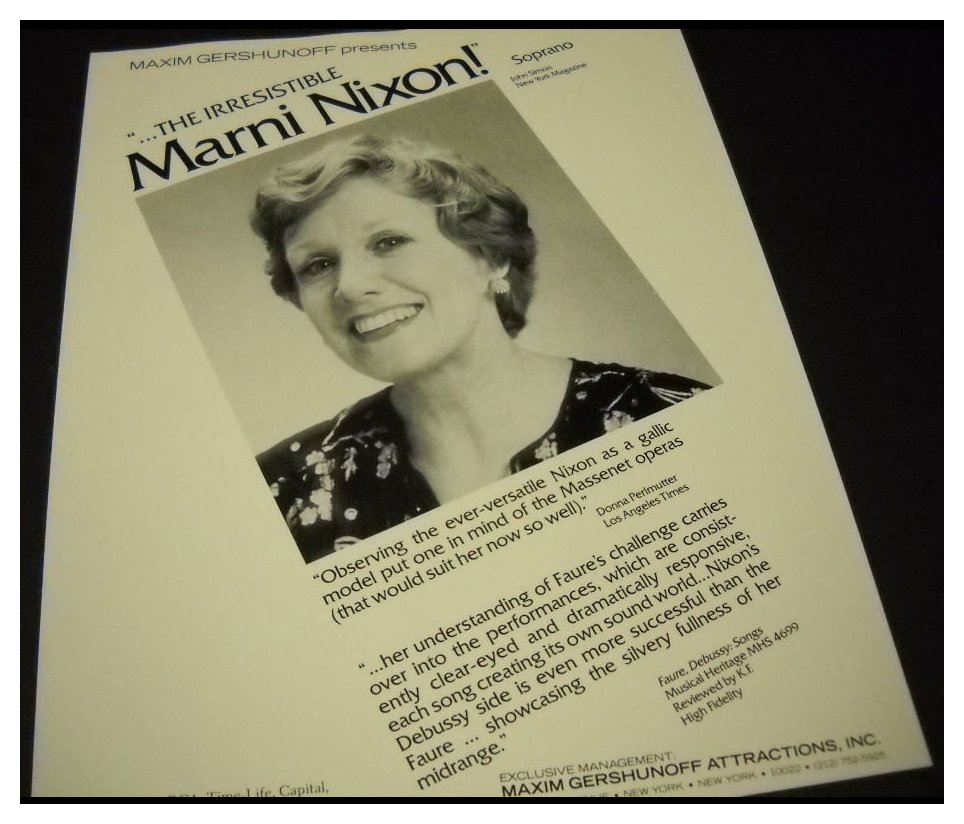 |
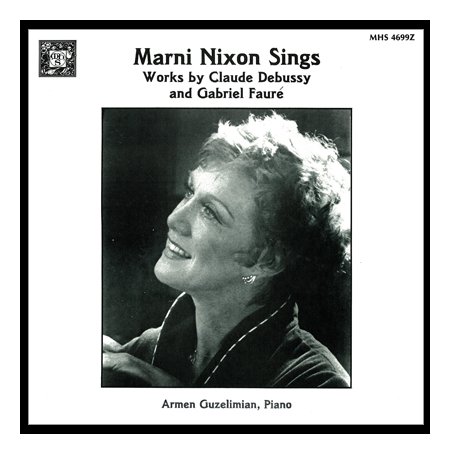 MN: It’s like
defining
what’s gone wrong with Broadway. It’s such a complex
problem. First of all, just to dip into the
circle in some way, I don’t know what starts what or in what sequence
it happened, but there’s been an over-emphasis on huge operatic
voices. You have to make a career operatically to
exist economically as a singer, so the song in the meantime is what you
learn
before you really get where you want to get. This is the
impression people coming out of universities have, and the universities
have
taught them repertoire that was necessary to exist in the vocal realm
thirty years ago. The teachers only know that. The students
learn that very well, and faster and quicker than they used to.
They come out of the universities, and there’s nothing there.
Then they find that actors who can’t sing are getting the jobs.
Why? Because they
can communicate, and one forgets the fact that they can’t sing, or they
eventually learn how to sing besides, or they go into opera. The
opera world requires the singers to sing in these huge
auditoriums. They have to become amazons, and all the nuance goes
away. So the
satisfaction in singing a song — if you sing it
that way — goes down
the drain. It doesn’t hit the average person, and it doesn’t tell
a story anymore if you sing it too operatically. And yet these
huge
auditoriums make it necessary to produce these huge sounds, and you
have to spend so much of your energy and time just producing the sound
that you forget the meaning behind it, or it doesn’t come
through. So I think the concert organizations gradually were fed
by the agents who were pushing the operatic people, and would buy
people to do recitals that didn’t know really how to do recitals but
would sing a lot of operatic arias in a row, and said that was a
recital. Eventually the people who used to go to
recitals — maybe the European public who used to
love German Lieder and
French Mélodies, those
older people who were born in
Europe and came over here — are now dying away,
and their
generation is now being fed on instant gratification on
television. They don’t have all that knowledge of those kinds of
songs. They get fed so much of the opera that they never had the
lack of
any kind of entertainment. So they don’t seek the recital out as
some
necessary part of their cultural way of being, or to help their soul
hear these things. So gradually all of these things come to play,
and now everybody’s talking about it and writing about it, and the
singers are really able to identify that problem a little bit, and can
choose to say they don’t want to do opera. Their voice
isn’t big enough, so they’re going to do concerts, but there aren’t
any concerts, so they’re going to design a special program for their
church or
for their parents and their friends, and so you get to starting
again from scratch what the recital did in the very beginning.
That’s what I think is happening. It’s like a backlash
of this huge overblown sound.
MN: It’s like
defining
what’s gone wrong with Broadway. It’s such a complex
problem. First of all, just to dip into the
circle in some way, I don’t know what starts what or in what sequence
it happened, but there’s been an over-emphasis on huge operatic
voices. You have to make a career operatically to
exist economically as a singer, so the song in the meantime is what you
learn
before you really get where you want to get. This is the
impression people coming out of universities have, and the universities
have
taught them repertoire that was necessary to exist in the vocal realm
thirty years ago. The teachers only know that. The students
learn that very well, and faster and quicker than they used to.
They come out of the universities, and there’s nothing there.
Then they find that actors who can’t sing are getting the jobs.
Why? Because they
can communicate, and one forgets the fact that they can’t sing, or they
eventually learn how to sing besides, or they go into opera. The
opera world requires the singers to sing in these huge
auditoriums. They have to become amazons, and all the nuance goes
away. So the
satisfaction in singing a song — if you sing it
that way — goes down
the drain. It doesn’t hit the average person, and it doesn’t tell
a story anymore if you sing it too operatically. And yet these
huge
auditoriums make it necessary to produce these huge sounds, and you
have to spend so much of your energy and time just producing the sound
that you forget the meaning behind it, or it doesn’t come
through. So I think the concert organizations gradually were fed
by the agents who were pushing the operatic people, and would buy
people to do recitals that didn’t know really how to do recitals but
would sing a lot of operatic arias in a row, and said that was a
recital. Eventually the people who used to go to
recitals — maybe the European public who used to
love German Lieder and
French Mélodies, those
older people who were born in
Europe and came over here — are now dying away,
and their
generation is now being fed on instant gratification on
television. They don’t have all that knowledge of those kinds of
songs. They get fed so much of the opera that they never had the
lack of
any kind of entertainment. So they don’t seek the recital out as
some
necessary part of their cultural way of being, or to help their soul
hear these things. So gradually all of these things come to play,
and now everybody’s talking about it and writing about it, and the
singers are really able to identify that problem a little bit, and can
choose to say they don’t want to do opera. Their voice
isn’t big enough, so they’re going to do concerts, but there aren’t
any concerts, so they’re going to design a special program for their
church or
for their parents and their friends, and so you get to starting
again from scratch what the recital did in the very beginning.
That’s what I think is happening. It’s like a backlash
of this huge overblown sound.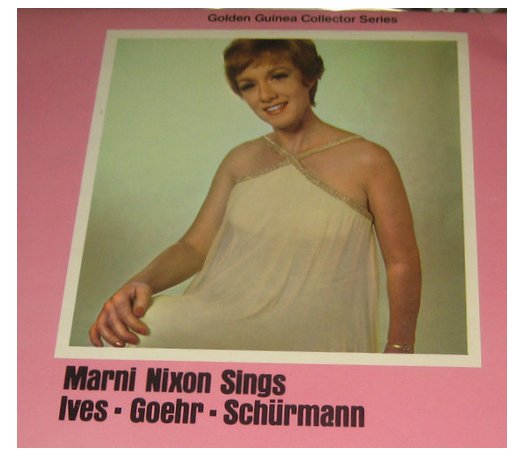 BD: Are the
colleges and universities perhaps turning
out too many people who want to be singers?
BD: Are the
colleges and universities perhaps turning
out too many people who want to be singers?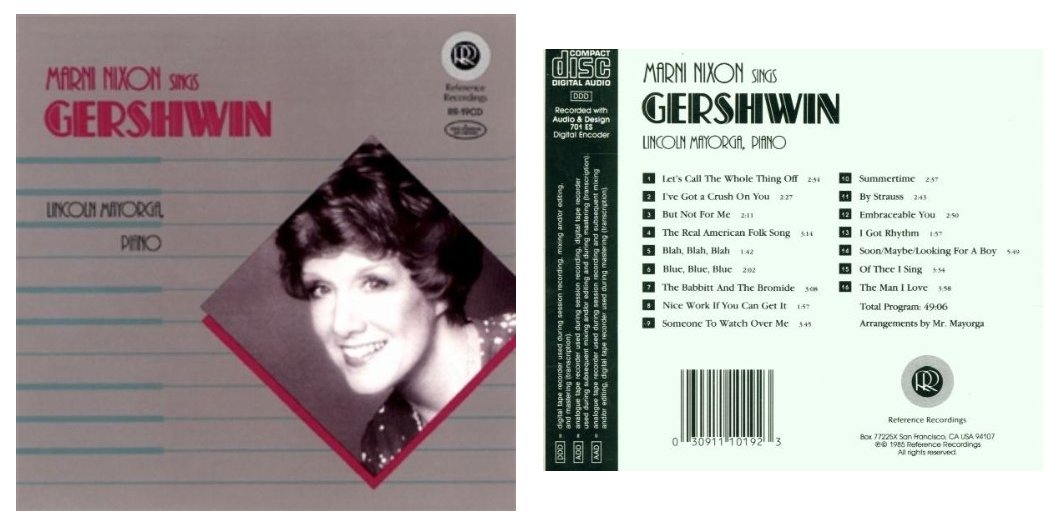
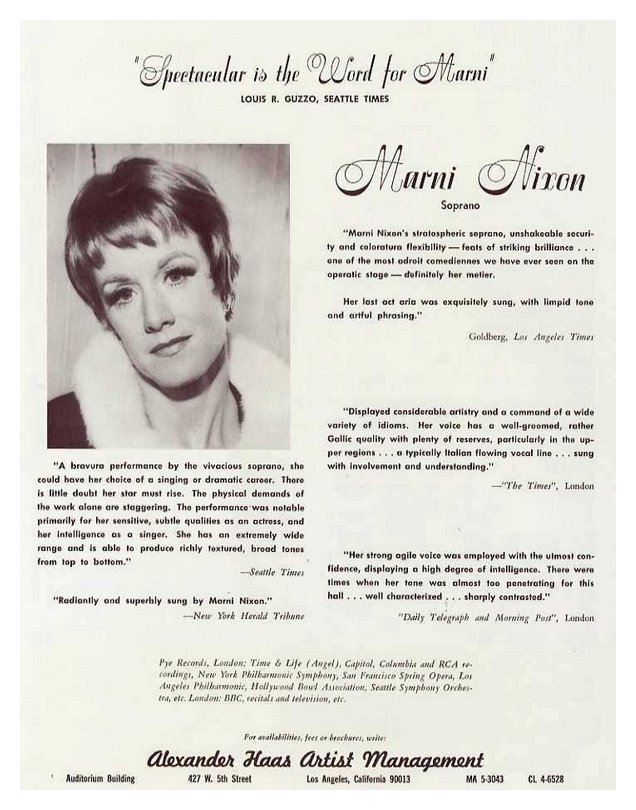 BD: When you’re
doing a live performance, do you ever
feel that you’re competing with your recorded material?
BD: When you’re
doing a live performance, do you ever
feel that you’re competing with your recorded material?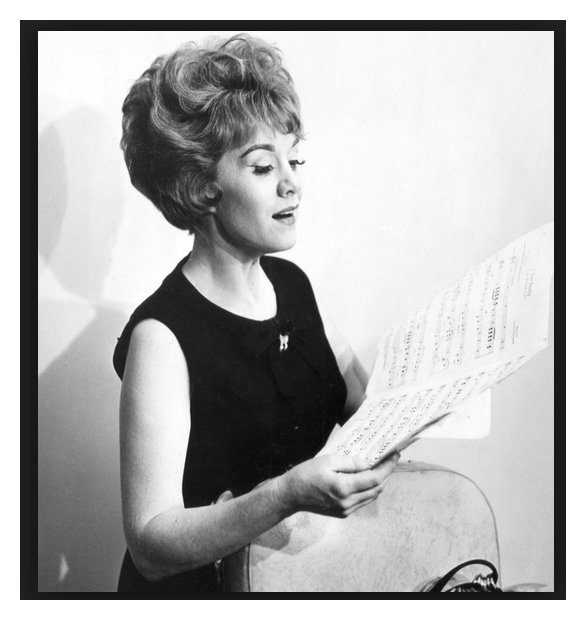 MN: I enjoy recitals
the most because you can define
the material. It’s really your show, and you can
do it exactly for your voice. But there is something about the
operatic stage where you’ve got the dramatics for you. You’ve got
the costumes, you’ve got the hair, you’ve got the orchestra, you’ve got
the fellow performers. You can just plug yourself into it and
really get yourself into the role. You can really be complete
within that. I find that the most
glorious thing. I miss it a lot. I miss doing a lot
of oratorio singing, which I also like.
MN: I enjoy recitals
the most because you can define
the material. It’s really your show, and you can
do it exactly for your voice. But there is something about the
operatic stage where you’ve got the dramatics for you. You’ve got
the costumes, you’ve got the hair, you’ve got the orchestra, you’ve got
the fellow performers. You can just plug yourself into it and
really get yourself into the role. You can really be complete
within that. I find that the most
glorious thing. I miss it a lot. I miss doing a lot
of oratorio singing, which I also like. 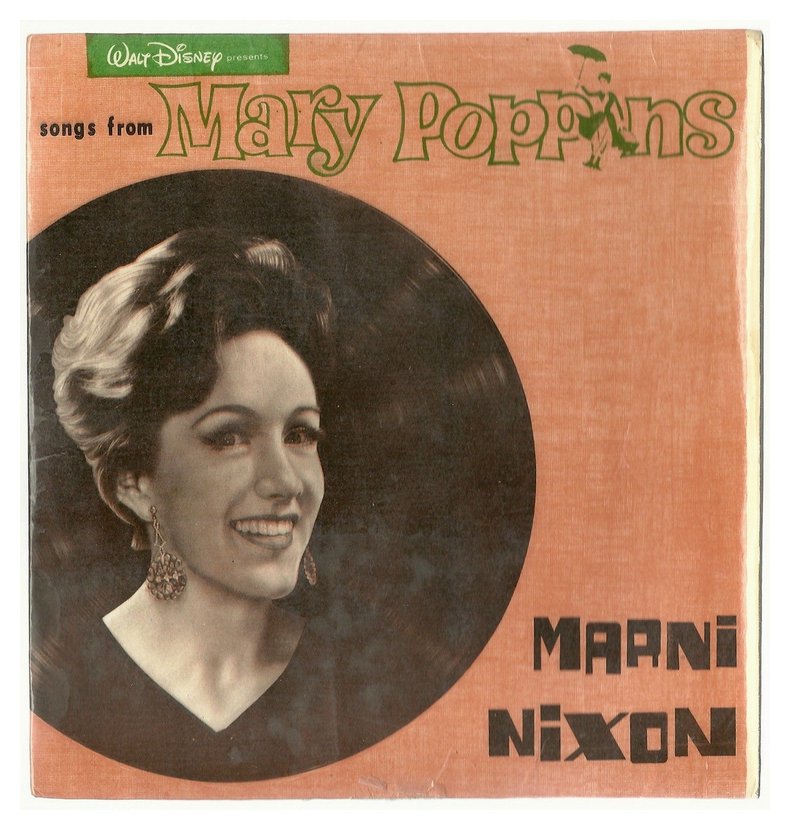
 BD: Do we expect
singers to be super-human?
BD: Do we expect
singers to be super-human?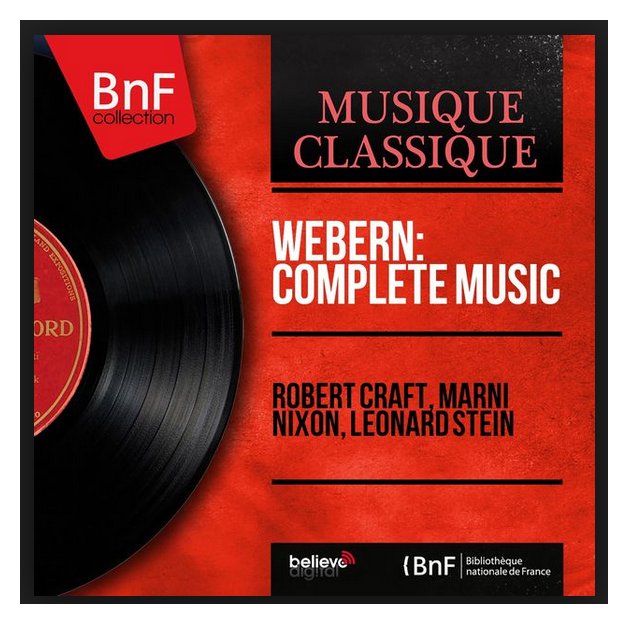 BD: Do the
composers writing today know how to write for the
voice?
BD: Do the
composers writing today know how to write for the
voice?© 1987 Bruce Duffie
This conversation was recorded in Chicago on June 10, 1987. Portions were broadcast on WNIB in 1990, and again in 1995 and 2000. This transcription was made in 2014, and posted on this website at that time. My thanks to British soprano Una Barry for her help in preparing this website presentation.
To see a full list (with links) of interviews which have been transcribed and posted on this website, click here.
Award - winning broadcaster Bruce Duffie was with WNIB, Classical 97 in Chicago from 1975 until its final moment as a classical station in February of 2001. His interviews have also appeared in various magazines and journals since 1980, and he now continues his broadcast series on WNUR-FM, as well as on Contemporary Classical Internet Radio.
You are invited to visit his website for more information about his work, including selected transcripts of other interviews, plus a full list of his guests. He would also like to call your attention to the photos and information about his grandfather, who was a pioneer in the automotive field more than a century ago. You may also send him E-Mail with comments, questions and suggestions.